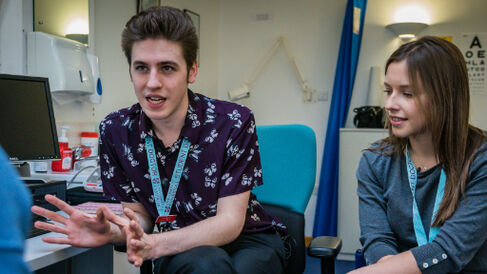Preparing for Patients

Preparing for Patients (PfP) is a programme that provides medical students at the University of Cambridge with early patient contact. The first three years of your medical studies in Cambridge concentrate on the science that underlies medicine. Alongside this study, running throughout your first three years, you will undertake a programme designed to provide you with opportunities to relate your class work to real patients’ experiences of health problems. The programme will also prepare you for clinical study by helping you progressively to develop the communication skills you will need to interact successfully with patients.
All documents relating to the PfP course will be available on the Moodle site.
There are 4 modules of PfP:
- PfP A involves meeting patients in general practice (year 1) at times arranged by the Faculty of Biology.
- PfP B involves meeting patients in a hospital setting (year 2)
- PfP C involves visiting community-based health-related agencies (year 2/3) at times arranged by you.
- PfP D enables you to follow a pregnant woman and her family at home over some time (year 3) at times agreed between yourself and the pregnant women.
These four elements provide a complementary set of different experiences that will build on each other to progress your abilities and understanding of communication and the patient’s perspective of illness. The course emphasises many issues relevant to your training as a medical student:
- the importance of communication between doctor and patient
- patients’ perception of illness and the personal and social factors relating to this
- the relationship between the patient’s perception of illness and their underlying disease
- inter-relationships between the various organisations and agencies that provide support for people with health-related problems
- the use of reflection in learning clinical medicine.
PfP is designed to help you take the first steps in developing the skills and competencies that form the basis for effective communication in medical interviews. In later years you undertake the full Clinical Communication Skills course which further combines competencies in communication skills, history taking and clinical examination in an integrated approach to illness and disease.
PfP is one of the 2nd MB subjects, and you will therefore be required to pass all four strands, A, B, C and D, to be qualified to proceed to clinical school.
Special arrangements have been made for affiliated, transfer and other students following the medical course "not for honors" to complete PfP. As these students will be doing only the first two years of the preclinical course (Parts IA and IB), they will need to do PfPC and D a little earlier than their contemporaries. Standard undergraduates will do PfPA in their first year, PfPB in their second year, PfPC in the Long Vacation between their second and third year, and PfPD in their third year. Students doing the course in two years will do PfPA in their first year, PfPC in the Long Vacation between their first and second year, and PfPB and D in their second year.
In addition to following the standard undergraduate course, Cambridge Graduate Course Students (CGC) undertake a number of clinical attachments, on which they must submit written assignments in the first two years of the course. The Faculty Board of Clinical Medicine have approved this patient contact element of the CGC as equivalent to PfP, and CGC students are therefore exempt from the formal requirement to take PfP for the 2nd MB.
You are required to submit coursework for each of the four strands. You will find details of what is required in the course handbooks.
